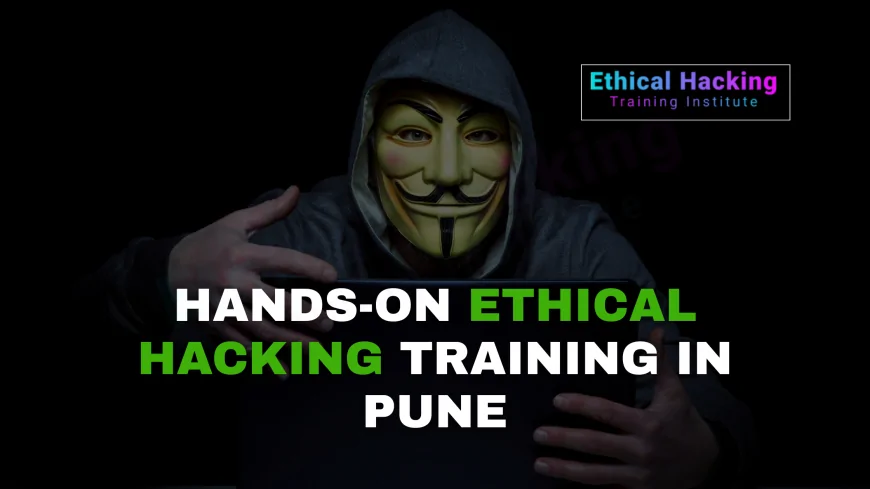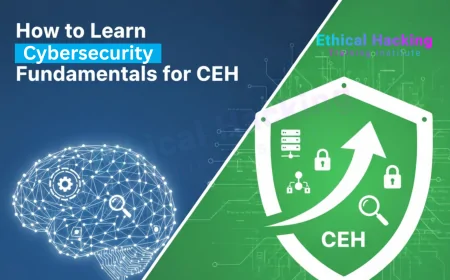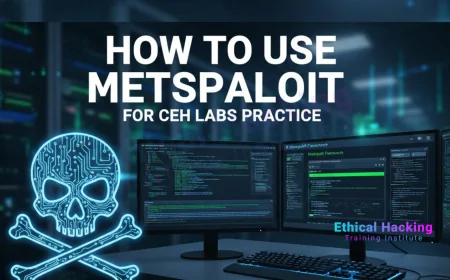Hands-On Ethical Hacking Training in Pune | Master Real-World Cybersecurity Skills
Join the most comprehensive hands-on ethical hacking training in Pune and gain real-world cybersecurity skills. Learn penetration testing, network security, and ethical hacking tools through live labs, expert guidance, and practical projects. Boost your career with in-demand cybersecurity expertise.

In today's digital age, cybersecurity threats are escalating, making ethical hacking an essential skill for safeguarding information systems. Pune, a burgeoning IT hub, offers a fertile ground for aspiring ethical hackers to gain practical, hands-on experience. This guide delves into the facets of hands-on ethical hacking training in Pune, highlighting its significance, curriculum, and career prospects.
Why Choose Hands-On Ethical Hacking Training?
Ethical hacking involves simulating cyberattacks to identify and fix security vulnerabilities. Hands-on training is crucial as it allows learners to:
-
Apply theoretical knowledge in real-world scenarios.
-
Use industry-standard tools like Nmap, Wireshark, and Metasploit.
-
Develop problem-solving skills by tackling live security challenges.
-
Understand the hacker's mindset to better defend against attacks.
Such immersive training ensures that learners are job-ready and capable of handling complex security tasks.
Core Modules in Ethical Hacking Training
A comprehensive hands-on ethical hacking course typically covers:
-
Networking Fundamentals: Understanding protocols, IP addressing, and subnetting.
-
Footprinting and Reconnaissance: Gathering information about targets using tools like WHOIS and DNS interrogation.
-
Scanning Networks: Identifying live hosts, open ports, and services.
-
Enumeration: Extracting detailed information about network resources.
-
System Hacking: Learning techniques for password cracking and privilege escalation.
-
Malware Threats: Studying viruses, worms, and Trojans, and their countermeasures.
-
Sniffing and Spoofing: Capturing and analyzing network traffic.
-
Social Engineering: Understanding human-based attacks like phishing and pretexting.
-
Denial of Service (DoS) Attacks: Learning about attack vectors and mitigation strategies.
-
Session Hijacking: Exploiting web session control mechanisms.
-
Web Server and Application Hacking: Identifying and exploiting vulnerabilities in web applications.
-
Wireless Network Hacking: Cracking WEP/WPA keys and deploying rogue access points.
-
Mobile Platform Hacking: Securing mobile devices and applications.
-
Cloud Computing and IoT Security: Protecting cloud infrastructures and IoT devices.
-
Cryptography: Understanding encryption algorithms and cryptographic attacks.
-
Penetration Testing: Conducting authorized simulated attacks to assess system security.
-
Security Policies and Compliance: Implementing organizational security policies and understanding compliance standards.
-
Incident Response and Forensics: Handling security breaches and conducting digital forensics.
-
Career Pathways in Ethical Hacking: Exploring various roles and certifications in cybersecurity.
Practical Training Environment
Hands-on ethical hacking courses in Pune provide:
-
Lab-Based Learning: Simulated environments to practice attacks and defenses.
-
Real-Time Projects: Working on live projects to understand real-world challenges.
-
Capture The Flag (CTF) Exercises: Gamified challenges to test skills.
-
Tool Familiarization: Using tools like Burp Suite, Nessus, and Aircrack-ng.
These practical sessions enhance understanding and build confidence in handling security tasks.
Career Opportunities Post-Training
Completing a hands-on ethical hacking course opens doors to various roles:
-
Penetration Tester
-
Security Analyst
-
Network Security Engineer
-
Cybersecurity Consultant
-
Incident Responder
-
Security Auditor
With Pune's growing IT sector, professionals trained in ethical hacking are in high demand.
Certifications to Pursue
Post-training, obtaining certifications can validate your skills:
-
Certified Ethical Hacker (CEH)
-
CompTIA Security+
-
Offensive Security Certified Professional (OSCP)
-
Certified Information Systems Security Professional (CISSP)
These certifications enhance employability and open up advanced career paths.
FAQ's
1. What is hands-on ethical hacking training?
Hands-on ethical hacking training is a practical approach where learners simulate real-world cyberattacks in controlled environments. It goes beyond theory by offering live labs, security tools, and real-time scenarios to master penetration testing, vulnerability assessment, and threat analysis. This method enhances readiness for cybersecurity roles in today’s digital world.
2. Why is Pune considered a hub for ethical hacking training?
Pune is home to a rapidly growing IT industry and many cybersecurity-focused organizations. This demand has led to the emergence of specialized training institutes offering advanced ethical hacking programs, real-time labs, and job-focused skills. Pune's strong tech ecosystem makes it ideal for aspiring ethical hackers to build a career.
3. Who can join ethical hacking training in Pune?
Students, IT professionals, engineers, and anyone passionate about cybersecurity can join. Whether you're a beginner or looking to upgrade your skills, hands-on ethical hacking training is tailored to different levels and backgrounds. A basic understanding of computers and networking is beneficial but not always mandatory.
4. What are the main topics covered in ethical hacking training?
Key topics include network scanning, system hacking, malware analysis, social engineering, wireless hacking, cryptography, and penetration testing. Real-world tools like Metasploit, Nmap, Burp Suite, and Wireshark are used in labs. Courses often include live projects and CTF (Capture The Flag) challenges to simulate attacks and defenses.
5. Is prior coding experience needed for ethical hacking?
While prior coding knowledge is helpful, it’s not always necessary. Many ethical hacking courses in Pune start from the basics and teach scripting languages like Python or Bash as part of the curriculum. Over time, learners pick up the programming required to automate tasks and exploit vulnerabilities.
6. What certifications can I pursue after ethical hacking training?
After completing training, you can aim for certifications such as CEH (Certified Ethical Hacker), OSCP (Offensive Security Certified Professional), CompTIA Security+, and CISSP. These globally recognized credentials validate your skills and significantly boost job opportunities in cybersecurity roles across the globe.
7. How long does hands-on ethical hacking training usually take?
The duration typically ranges from 2 to 6 months depending on the course level (basic to advanced), mode (weekend or weekday), and learning pace. Intensive bootcamps may offer faster learning, while comprehensive programs offer in-depth, slow-paced modules with real-time labs and projects.
8. What practical tools are used during training?
Common tools include Nmap for scanning, Metasploit for exploitation, Wireshark for packet analysis, Burp Suite for web app testing, Aircrack-ng for WiFi attacks, and John the Ripper for password cracking. Learners get hands-on experience using these tools in a controlled environment to mimic real-world attacks.
9. Are job placements offered after ethical hacking training in Pune?
Many ethical hacking training institutes in Pune offer placement assistance, resume-building support, and interview preparation. While placements are not always guaranteed, strong hands-on skills and certifications can significantly increase your chances of landing roles such as penetration tester or cybersecurity analyst.
10. What kind of career can I pursue after training?
You can explore roles like Ethical Hacker, Penetration Tester, Security Analyst, SOC Analyst, Malware Analyst, and Cybersecurity Consultant. As organizations prioritize data protection, ethical hackers are in high demand across industries like finance, IT, healthcare, and government sectors.
11. Is ethical hacking training available online in Pune?
Yes, many institutes in Pune offer both in-person and online training options. Online programs include virtual labs, instructor-led classes, recordings, and chat-based doubt resolution. This flexibility allows working professionals and remote learners to gain ethical hacking skills from the comfort of their homes.
12. How much does ethical hacking training cost in Pune?
Training costs vary depending on the course depth and duration, ranging from ₹15,000 to ₹60,000. Some programs also include certification exam vouchers, live projects, and placement assistance. It’s important to compare course content and practical exposure before making a decision based on cost.
13. Are there beginner-friendly ethical hacking courses in Pune?
Absolutely. Several programs are designed specifically for beginners, focusing on the fundamentals of cybersecurity, networking, and ethical hacking. These courses offer guided labs, tool tutorials, and mentorship to build a strong foundation before moving on to advanced offensive security concepts.
14. How do ethical hacking labs work during training?
Labs simulate real-time attacks and defenses in isolated environments. Learners use virtual machines or cloud-based sandboxes to practice hacking techniques safely. Tasks include exploiting vulnerabilities, performing reconnaissance, and writing scripts. Lab-based training ensures that students gain hands-on problem-solving experience.
15. Can ethical hacking be self-taught, or is formal training necessary?
While many resources are available online, formal training provides structured learning, mentorship, and practical labs. This ensures you don’t miss key concepts and learn tools in the correct order. Additionally, training from experienced professionals speeds up your learning and aligns you with industry demands.
16. Do ethical hacking courses include soft skills or just technical training?
Comprehensive programs often include modules on communication, documentation, and report writing—essential for presenting security findings. Professionals are trained to work in teams, write vulnerability reports, and deliver insights to non-technical stakeholders, making them more effective in organizational settings.
17. Are internships part of ethical hacking training in Pune?
Some hands-on ethical hacking courses offer internships or live project opportunities to gain real industry exposure. Internships allow students to work with security teams, perform audits, and even contribute to security assessments, adding real-world experience to their resume.
18. What makes hands-on ethical hacking training better than theory-only courses?
Hands-on training focuses on applying knowledge, not just memorizing concepts. Learners use hacking tools in real scenarios, analyze results, and troubleshoot issues—skills essential in real-world jobs. This practical approach builds confidence and capability that theory-only courses cannot match.
19. Can I become a freelance ethical hacker after training?
Yes, with the right skills, portfolio, and certifications, you can work as a freelance penetration tester or security consultant. Freelancers often find work through platforms like Upwork, HackerOne, or Bugcrowd, where clients look for experts to test systems and identify vulnerabilities.
20. What’s the future scope of ethical hacking as a career in India?
The scope is massive and growing. With increasing digitalization and cyber threats, ethical hackers are essential for data protection. Government policies, startup ecosystems, and global companies in India are hiring ethical hackers to secure their infrastructure, making it a highly rewarding and future-proof career.
Securing Your Future in Ethical Hacking
Hands-on ethical hacking training in Pune equips you with the practical skills needed to excel in the cybersecurity domain. By engaging in real-world scenarios and using industry-standard tools, you become adept at identifying and mitigating security threats. As cyber threats continue to evolve, the demand for skilled ethical hackers will only grow, making this an opportune time to embark on this career path.
What's Your Reaction?
 Like
0
Like
0
 Dislike
0
Dislike
0
 Love
0
Love
0
 Funny
0
Funny
0
 Angry
0
Angry
0
 Sad
0
Sad
0
 Wow
0
Wow
0


















